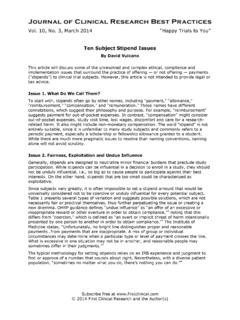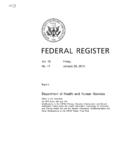Transcription of Laws, Regulations and Clinical Trial Agreements
1 laws , Regulations and Clinical Trial Agreements Norman M. Goldfarb President & CEO, First Clinical research , Inc. Chairman, Model agreement Group Initiative (MAGI) (415) 681-4657 40 Hillway Ave., San Francisco, California 94117 USA Abstract: As Clinical research increasingly becomes a global enterprise, investigators and sponsors must deal with multiple legal jurisdictions, with differing laws , Regulations and other rules. A mutual understanding of the legal environment will streamline the Clinical Trial agreement negotiation process and avoid contracts that are legally unenforceable. A sampling of laws and other rules that impact Clinical Trial Agreements is provided. The objective of this paper is to elicit contributions to a comprehensive and detailed compilation of rules that impact Clinical study Agreements .
2 The Legal Environment As Clinical research increasingly becomes a global enterprise, investigators and sponsors must deal with multiple legal jurisdictions, with differing laws , Regulations and other rules. (The term law, as used in this paper, includes both laws and Regulations .) These rules establish expectations based on each party s locale. Public and non-profit entities also have various legal constraints. These rules limit the flexibility of investigators ( , research sites) when negotiating Clinical Trial Agreements (CTAs). The objective of this paper is to elicit contributions to a comprehensive and detailed compilation of rules that impact Clinical study Agreements . Because the rules may be numerous, obscure or subject to change and differing interpretations, it is often difficult even for contract specialists in the affected organizations to understand their application in specific circumstances and to intricate language drafted by sponsors.
3 A mutual understanding of these regional and institutional differences by both sponsors and investigators will streamline the Clinical Trial agreement negotiation process. Investigators are subject to rules on multiple levels: International Multinational National State or Province Ethics Committee Institutional Societal International. Various international bodies that define rules for Clinical research such as the Nuremberg Code, Declaration of Helinski, and the International Conference on Harmonization ICH E6 Guideline for Good Clinical Practice. However, they do not enforce their rules; they leave that to governments. (There may, someday, be an exception to this generalization: The World Trade Organization theoretically could adjudicate accusations of unfair Clinical research trade practices.)
4 In addition, some industry associations publish ethical codes that require member compliance with international rules. Multinational. Multinational laws may apply. The European Union (EU) and Mercosur (Uruguay, Paraguay, Argentina and Brazil) have published extensive laws for their member states. Member states may or may not be required to enforce these laws as their own. Adoption of the EU Clinical Trials Directive by member states is required, and an arduous process of approximation is now in progress. Of the Mercosur members, only Uruguay legally enforces Mercosur laws as its own. National. Nations in the developed world, and many in the developing world, have laws that govern the conduct of Clinical research within their borders, and sometimes outside their borders. These laws are generally variations on a theme, although the variations can be quite significant, and rules that some countries consider important may be absent in other countries.
5 In practice, levels of reporting, auditing and enforcement vary widely, with none at all apparent in some countries. State and Province. States and provinces may have their own laws that specifically or incidentally govern Clinical research . This generality applies to every state in the United States, but with different specifics. The author is unaware of any county, city or parish laws specific to Clinical research , although they may exist, perhaps in countries without states or provinces. Ethics Committees. Ethics committees may have rules that do not have legal force but, for practical purposes, are strictly required. Ethics committees may review CTAs as part of their normal review process; anything that potentially impinges on subject welfare (or anything else they consider within their jurisdiction) may receive their attention.
6 Institutional. Institutional laws place requirements on specific types of entities such as federal, state, non-profit, or those that receive funding from those sources. Non-negotiable rules of the entity that are not legal requirements are not addressed in this paper. Such rules may originate from the entity s idiosyncratic interpretation of the laws , which have been known to be ambiguous. Societal. The customs of a society may prohibit contract terms that are otherwise legal. Concepts of personal privacy, for example, may be problematic in societies where the individual is subordinate to the extended family. A study may be subject to conflicting laws , even if the sponsor and investigator are in the same legal jurisdictions. These conflicts are normally resolved by priority of law, , national laws override state laws , but it may not always be straightforward to untangle (or remember) overlapping conditional requirements, authorizations and prohibitions.
7 For example, if HIPAA requires a disclosure and a state law prohibits it, which prevails? Some laws may apply to one party to an agreement , but not to the other party, , if they are in different jurisdictions or are different types of entities. The parties to the agreement may be unaware of the conflicts of law, unaware of a law at all, or may interpret differently the laws or to whom they apply. When the sponsor and investigator have knowledge of the entire legal environment, time need not be wasted attempting to negotiate terms that are clearly illegal. Negotiation of the law s interpretation and implementation will provide adequate stimulation for the parties. Of course, there may be circumstances when the conflict between laws , Regulations , and legally or self-imposed institutional restrictions make an agreement impossible, but it s better to find out sooner rather than later if the conflicts are insurmountable.
8 Forces for Change Unlike most other global industries, Clinical research has an intense regulatory component. Increasing globalization of both the medical products and Clinical research industries will encourage legal convergence to enable data collected anywhere in the world to support marketing applications anywhere in the world. As developing countries with low costs and ready availability of subjects gain market share, they will come under increasing pressure to adopt and enforce the legal standards of developed countries, , ICH GCP guidelines. This pressure will come from sponsors in developed countries as well as competition between developing countries. Technology will drive evolution in the legal environment. For example, the impossibility of maintaining anonymity of biological samples containing DNA or RNA, which intrinsically identify their source, eventually will be addressed.
9 A broader understanding of the complex terrain of the legal landscape may also encourage regulatory simplification and rationalization. Clinical Trial agreement Content Because Clinical Trial Agreements are legal documents, much of their content necessarily has a legal flavor to it. Sponsors, however, are often tempted to include great detail in CTAs about the investigator s regulatory ( , GCP) responsibilities. This practice places the burden on the sponsor to understand the investigator s full legal and regulatory environment and make relevant laws accessible to the investigator. An incorrect definition of a term that has a legal definition is obviously asking for trouble. Describing the requirements for informed consent is a minefield, as illustrated in Table 1 below. Clinical Trial Agreements should include suitable citations and accommodate investigators who do not have easy access to these laws (in their native language).
10 Sponsor personnel should have the means to monitor investigator compliance and advise investigators when they stray. Current compliance with this requirement is easily tested: Randomly select three CRAs who monitor ICH trials in the US and ask them to name five differences between FDA and ICH Good Clinical Practice. Clinical Trial Agreements may not be the best tools for educating the investigator of his/her regulatory responsibilities. In large, sophisticated research centers, the investigator often sees only the signature page of the agreement . In the small, unsophisticated sites that need the education, investigators generally do not read the CTA, and do not understand much of what they do read. On the other hand, these are also the sites least likely to enroll subjects and create compromised data.






